

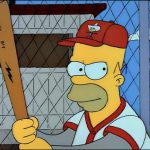

By popular demand of our readers, this week we’ll spotlight the characters of Matt Groening, with a run of episodes from The Simpsons focusing upon the local bush-league team of interest to Homer’s community – the Springfield Isotopes – or the little-league career of Bart, or, in one memorable episode, the softball career of Homer himself for the Springfield Power Plant. As a bonus, we’ll return to the 30th century, for another look at the sport future-style with the cast of Futurama.
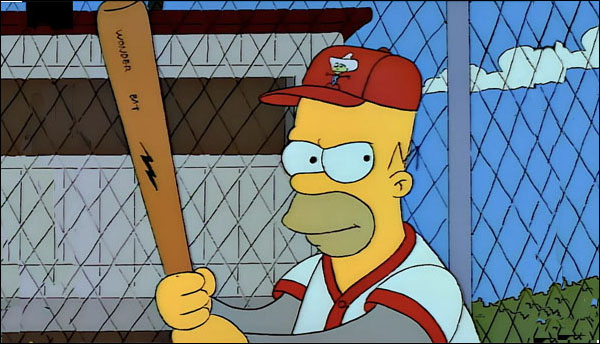
The first major appearance of the Isotopes seems to have been in season 2’s Dancin’ Homer (11/8/90). Homer and the family take in a game on Nuclear Plant Employees, Spouses, and No More Than Three Children Night, along with a busload of others from the plant, including Mr. Burns and Smithers. Burns as usual can’t remember Homer’s name, yet develops an odd comradery with him when he takes a seat next to Homer in the stands (after Burns’s attempt to toss out the first ball, which travels about three feet). The two discover a mutual appreciation for guzzling Duff beer by the bucketful, and razzing the players on the field. Down by three runs but with the bases loaded, Big Joe McClosky comes to bat for the team, the radio announcer immediately expressing the crowd’s total lack of confidence in him. “And as soon as Joe pops out, we’ll go right to the post-game show.” But Homer leaps out in front of the fans, criticizing them for lack of showing the team support, and initiates a rally by striking up an energetic impromptu dance to the organ accompaniment of Mancini’s “Baby Elephant Walk” Homer’s narration remarks that it wasn’t the intoxication of the beer that motivated him, but the intoxication of making a public spectacle of himself. The crowd’s enthusiasm spills over to the batter, who hits a game-winning grand slam. Only Burns seems to be disapproving, calling Homer’s antics shameless, and instructing Smithers to have Homer banned for life from all company outings. Yet the Isotopes’ owner approaches Homer with a proposition – to become the team’s new mascot.
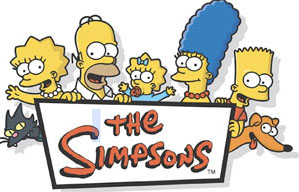 Homer’s spurring on of the Isotopes to their first win all season is followed by another victory, and another, and a streak of wins, all sparked by his dancing. One day, however, the streak unexplainably breaks, the Isotopes suffering a loss, and even some of the fans seeming to lose a little steam in their interest in Homer’s capering. Homer is called to the executive office for a meeting with the owner. He thinks he is going to be fired unfairly just because of one game lost. Instead, the word has come down the grapevine that Homer is being called up to the big-leagues – to assist as a back-up mascot for the professional team in Capital City. With expectations high, though some spirits low at having to uproot the family and move away from their home and friends in beloved Springfield, the Simpsons pack up and drive to Capital City, where they are greeted in song by a surprise cameo from Tony Bennett, who sings a catchy original song about the town composed for the production. Alas, Homer’s chance in the spotlight is short-lived. Though he tries his best, the sophisticated ball fans of the major leagues consider his routines pure corn, only fit for the farm teams, and only cheer when Homer is escorted off the field. The family returns to their old life in semi-disgrace, and, rather than return for a comeback with the Isotopes, Homer buries his dancing costume, and abandons all thoughts of mascoting for a career. Still, he is able to draw attention – at least from his pals at Moe’s tavern, who find his sob story of woe to be engrossing entertainment, and ask him to repeat it again. At least Homer knows where his true friends are.
Homer’s spurring on of the Isotopes to their first win all season is followed by another victory, and another, and a streak of wins, all sparked by his dancing. One day, however, the streak unexplainably breaks, the Isotopes suffering a loss, and even some of the fans seeming to lose a little steam in their interest in Homer’s capering. Homer is called to the executive office for a meeting with the owner. He thinks he is going to be fired unfairly just because of one game lost. Instead, the word has come down the grapevine that Homer is being called up to the big-leagues – to assist as a back-up mascot for the professional team in Capital City. With expectations high, though some spirits low at having to uproot the family and move away from their home and friends in beloved Springfield, the Simpsons pack up and drive to Capital City, where they are greeted in song by a surprise cameo from Tony Bennett, who sings a catchy original song about the town composed for the production. Alas, Homer’s chance in the spotlight is short-lived. Though he tries his best, the sophisticated ball fans of the major leagues consider his routines pure corn, only fit for the farm teams, and only cheer when Homer is escorted off the field. The family returns to their old life in semi-disgrace, and, rather than return for a comeback with the Isotopes, Homer buries his dancing costume, and abandons all thoughts of mascoting for a career. Still, he is able to draw attention – at least from his pals at Moe’s tavern, who find his sob story of woe to be engrossing entertainment, and ask him to repeat it again. At least Homer knows where his true friends are.
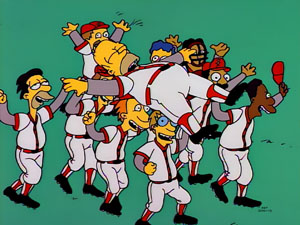 Homer At the Bat (2/20/92) moves our action to the amateur level – or so it seems. Sign-up sheets are on the bulletin board for the nuclear power plant softball team. Homer is first to sign, but his co-workers seem to have little interest, after last year’s 2 win and 26 loss season – their best ever. But Homer claims to have a secret weapon this year. The others imagine everything from spring-powered shoes to industrial laser rays, and quickly sign up to follow Homer. In reality, Homer’s secret is merely a homemade bat carved from a branch of a tree struck by lightning, which he names Wonderbat.
Homer At the Bat (2/20/92) moves our action to the amateur level – or so it seems. Sign-up sheets are on the bulletin board for the nuclear power plant softball team. Homer is first to sign, but his co-workers seem to have little interest, after last year’s 2 win and 26 loss season – their best ever. But Homer claims to have a secret weapon this year. The others imagine everything from spring-powered shoes to industrial laser rays, and quickly sign up to follow Homer. In reality, Homer’s secret is merely a homemade bat carved from a branch of a tree struck by lightning, which he names Wonderbat.
At a first game against the Springfield police squad (in a league where it is required regulation to chug a beer at every base and between most innings), Homer’s bat actually does the trick, scoring home run after home run. The disgruntled Chief Wiggams instructs his deputy to take down Homer’s vehicle license and registration. Homer’s streak continues throughout the season, until the team is one game away from taking the championship. A rival power plant owner makes a friendly wager with Mr. Burns at the country club over which team will take the championship – to the tune of one million dollars. Burns later asks Smithers if it is all right to cheat to win a million dollar bet. Smithers replies no, until Burns says, “Let me rephrase that”, changing the question to whether it is all right for him to cheat. Of course, Smithers’ answer changes to an agreeable yes.
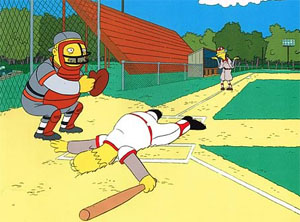 Burns thus assembles, with the scouting help of Smithers, an illustrious team of nine ringers, hired from major league baseball for fake token positions at the plant to make tem eligible for the playoff game. Jose Canseco is offered $50,000 to play one game. He says it’s a pay cut, but it sounds like fun. Others recruited include Mike Scioscia, Steve Sax, Ken Griffey Jr., Ozzie Smith, Don Mattingley, Roger Clemens, Wade Boggs, and Darryl Strawberry. The company team members can see the writing on the wall as the new “employees” are introduced – with these guys around, who’s going to need the regular team? “Well, duh”, responds Burns. Homer too can see what’s coming, realizing Strawberry plays the same position as him – right field. “Are you better than me?”, Homer asks. Strawberry admits he’s never met Homer, but matter-of-factly answers the question: “Yes.”
Burns thus assembles, with the scouting help of Smithers, an illustrious team of nine ringers, hired from major league baseball for fake token positions at the plant to make tem eligible for the playoff game. Jose Canseco is offered $50,000 to play one game. He says it’s a pay cut, but it sounds like fun. Others recruited include Mike Scioscia, Steve Sax, Ken Griffey Jr., Ozzie Smith, Don Mattingley, Roger Clemens, Wade Boggs, and Darryl Strawberry. The company team members can see the writing on the wall as the new “employees” are introduced – with these guys around, who’s going to need the regular team? “Well, duh”, responds Burns. Homer too can see what’s coming, realizing Strawberry plays the same position as him – right field. “Are you better than me?”, Homer asks. Strawberry admits he’s never met Homer, but matter-of-factly answers the question: “Yes.”
Burns puts the team through intense practice sessions (in which Homer is no match for his new teammates’ pitching, which cracks his magic bat in two on the first pitch). Burns adds the extra insurance of team hypnosis to win, and drinks of brain and nerve tonic for enhancement. As he prepares the starting lineup of the new Springfield 9, he predicts that he can’t lose. Even the worst of luck could only result in the outside chance of up to seven misfortunes to his players, but never nine. That’s what he thinks. Steve Sax is picked up by Springfield police for doing absolutely nothing, and jailed on suspicion of every unsolved crime committed in his home town of New York. Ken Friffey Jr. develops gigantism as a side effect of the nerve tonic. Roger Clemens comes out from hypnosis thinking he is a chicken. Mike Scioscia develops radiation poisoning. Wade Boggs is punched out by Barney in a barroom argument over who was historically England’s greatest prime minister. And so on, leaving only Darryl Strawberry standing – in Homer’s shoes, with our hero still sitting on the bench. Burns’ final pep talk is more lame than Brain’s on “Pinky and the Brain” – not actually borrowing cliches from any prior speech, but asking the team to think of whatever inspirational phrases they can remember someone else having said, and to go out and win one. The ninth inning finds the team down by one run, with the bases loaded. Strawberry is up, and has hit a home run on every previous at bat. But Burns plays the percentages like a real manager. He can’t very well send the left-handed Strawberry up against a left-handed pitcher – so the time has come for a right-handed pinch hitter, Homer! Burns utters a confusing non-stop series of signals to Homer, who completely loses track of what Burns is saying by the second sentence. When Homer sets himself for his first swing, Burns engages in a jumbled dance of gyrating signals, causing Homer to glance away at him and utter “Huh?” He is immediately beaned by a pitch while he isn’t looking – winning the game by a free carry to first base. The show ends with a custom rendition of the song, “Talking Baseball”, changing lyrics to recap the various plights of the would-be ringers.
• A mockumentry featuring most of the highlights of “Homer At the Bat” plus some new footage is on Vimeo.
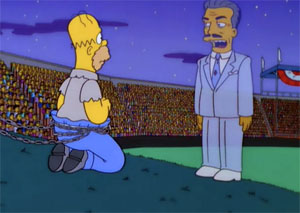 Hungry, Hungry Homer (3/4/01) cleverly chooses its title as a play-on-words from the popular children’s toy/game “Hungry, Hungry Hippos”, drawing a parallel between such creatures and Homer’s usual ravenous appetite. Homer has taken on a new leaf, after a visit to Blocko-World (Springfield’s equivalent to Legoland) in which Lisa gets gypped at a souvenir stand by being sold a model of the Eiffel Tower with one block missing. Marge doesn’t appreciate Homer’s defeatist attitude in front of the kids to the effect of “You can’t fight city hall”, and pep-talks him to go back to the park and stand up for Lisa’s rights. Homer does so, and surprisingly gets the missing spare part. He feels so good, he takes on a new life-motivation, as the guy who’ll stand up for the little guy, doing random good deeds everywhere. He overhears one of his pals at Moe’s complaining about how badly the Isotopes have been performing this season, after the team was acquired by the Duff Beer Corporation – so badly that he wants to get his money back on his season pass, but has been refused a refund. Homer volunteers to go to the executive offices at the stadium to seek justice and the money. The executive is not so easily swayed, and orders Homer out. Homer attempts to exit through the wrong doorway, entering one marked “Private”, and encounters a room full of souvenir merchandise, manufactured with the new team name of the Albuquerque Isotopes. “There’s no such team”, Homer laughs – until dawn breaks in his head. The team is going to be moved to Albuquerque!
Hungry, Hungry Homer (3/4/01) cleverly chooses its title as a play-on-words from the popular children’s toy/game “Hungry, Hungry Hippos”, drawing a parallel between such creatures and Homer’s usual ravenous appetite. Homer has taken on a new leaf, after a visit to Blocko-World (Springfield’s equivalent to Legoland) in which Lisa gets gypped at a souvenir stand by being sold a model of the Eiffel Tower with one block missing. Marge doesn’t appreciate Homer’s defeatist attitude in front of the kids to the effect of “You can’t fight city hall”, and pep-talks him to go back to the park and stand up for Lisa’s rights. Homer does so, and surprisingly gets the missing spare part. He feels so good, he takes on a new life-motivation, as the guy who’ll stand up for the little guy, doing random good deeds everywhere. He overhears one of his pals at Moe’s complaining about how badly the Isotopes have been performing this season, after the team was acquired by the Duff Beer Corporation – so badly that he wants to get his money back on his season pass, but has been refused a refund. Homer volunteers to go to the executive offices at the stadium to seek justice and the money. The executive is not so easily swayed, and orders Homer out. Homer attempts to exit through the wrong doorway, entering one marked “Private”, and encounters a room full of souvenir merchandise, manufactured with the new team name of the Albuquerque Isotopes. “There’s no such team”, Homer laughs – until dawn breaks in his head. The team is going to be moved to Albuquerque!
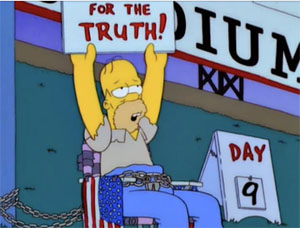 Homer tries to go public with the news, but the executive and Duffman have stashed away all the incriminating evidence by the time the press arrive at the stadium, and paint Homer to be a chronic liar. To prevent the imminent crushing blow to Springfield sports fans, and at the mention by Lisa of methods of getting attention, such as a hunger strike, Homer vows to do the personal impossible – stage his own hunger strike outside the stadium until the Duff Corporation tells the truth. He chains himself into a chair, then chains the chair to a light pole – only to too late notice the skeleton of another former hunger-striker left to rot in a chair on the opposite end of the courtyard. Most people ignore him, but many crowd around him as something of a freak-show novelty to get a few laughs. Duffman and the executive notice his attraction of attention from a stadium window, and the executive decides this can be turned to management’s advantage. So, at night while Homer sleeps, a work crew saws the light pole off its base, and transports the pole and Homer to a grass patch just behind the center field fence, where Homer is displayed at the next game as “Hungry, Hungry Homer”. Homer’s voice of protest is drowned out by the stadium announcer on the P.A. system, who states that Homer’s mission is to not eat until the team wins the championship.
Homer tries to go public with the news, but the executive and Duffman have stashed away all the incriminating evidence by the time the press arrive at the stadium, and paint Homer to be a chronic liar. To prevent the imminent crushing blow to Springfield sports fans, and at the mention by Lisa of methods of getting attention, such as a hunger strike, Homer vows to do the personal impossible – stage his own hunger strike outside the stadium until the Duff Corporation tells the truth. He chains himself into a chair, then chains the chair to a light pole – only to too late notice the skeleton of another former hunger-striker left to rot in a chair on the opposite end of the courtyard. Most people ignore him, but many crowd around him as something of a freak-show novelty to get a few laughs. Duffman and the executive notice his attraction of attention from a stadium window, and the executive decides this can be turned to management’s advantage. So, at night while Homer sleeps, a work crew saws the light pole off its base, and transports the pole and Homer to a grass patch just behind the center field fence, where Homer is displayed at the next game as “Hungry, Hungry Homer”. Homer’s voice of protest is drowned out by the stadium announcer on the P.A. system, who states that Homer’s mission is to not eat until the team wins the championship.
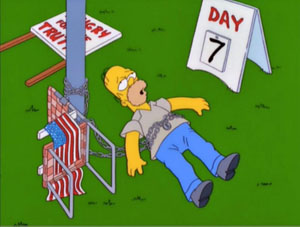 Homer begins to weaken rapidly, also disheartened that no one is hearing his true cause, and eventually becomes motionless on the grass. The management finally decides his crowd-appeal is waning, and removes him from his chains. Homer is dragged out before a mike, where the executive and Duffman urge him to publicly break his strike by eating one of the stadium’s newest taste sensation – the Isotope Dog Supreme. Homer’s will is about to crack – until he notices the ingredients on the dog, including mesquite grilled onions, jalapeno relish, mango lime salsa – Southwestern ingredients! The kind that would be appreciated in Albuquerque! The fans who have purchased one realize this is true – especially when they roll back the paper wrapper lining the inside, and find the dogs have been pre-packaged in wrappers turned inside-out, already displaying the logo for the Albuquerque Isotopes. The jig is up for the executive, amidst the boos and snarls of the irate fans, and even Duffman is swayed by Homer to fight for the little people, leading Duffman to toss the executive out over the fence. The mayor of Albuquerque, watching the game on TV, turns off the set, deciding that the Springfieders have too much spirit for him to successfully pry their team away. He thus asks his secretary to ask Dallas how much they want for the Cowboys. The secretary informs him that the Cowboys are a football team. “They’ll play what I tell ‘em to play”, insists the power-hungry mayor, as the scene closes upon him with darkening shadows over his face, and an evil look in his eyes.
Homer begins to weaken rapidly, also disheartened that no one is hearing his true cause, and eventually becomes motionless on the grass. The management finally decides his crowd-appeal is waning, and removes him from his chains. Homer is dragged out before a mike, where the executive and Duffman urge him to publicly break his strike by eating one of the stadium’s newest taste sensation – the Isotope Dog Supreme. Homer’s will is about to crack – until he notices the ingredients on the dog, including mesquite grilled onions, jalapeno relish, mango lime salsa – Southwestern ingredients! The kind that would be appreciated in Albuquerque! The fans who have purchased one realize this is true – especially when they roll back the paper wrapper lining the inside, and find the dogs have been pre-packaged in wrappers turned inside-out, already displaying the logo for the Albuquerque Isotopes. The jig is up for the executive, amidst the boos and snarls of the irate fans, and even Duffman is swayed by Homer to fight for the little people, leading Duffman to toss the executive out over the fence. The mayor of Albuquerque, watching the game on TV, turns off the set, deciding that the Springfieders have too much spirit for him to successfully pry their team away. He thus asks his secretary to ask Dallas how much they want for the Cowboys. The secretary informs him that the Cowboys are a football team. “They’ll play what I tell ‘em to play”, insists the power-hungry mayor, as the scene closes upon him with darkening shadows over his face, and an evil look in his eyes.
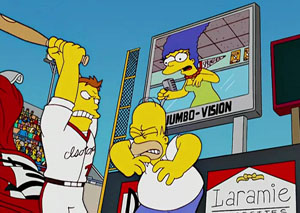 I really don’t have a lot to say about Homer and Marge Turn a Couple Play (5/21/06), as its focus really isn’t that much on baseball, but on the failing marriage of a player from the Springfield Isotopes. The team has acquired a new slugger, prompting Homer (and other fair-weather fans of the team) to actually attend a game again. A brief interesting sidelight has Grandpa Abe Simpson reminiscing about having played on that same field in 1942 – but Lisa reminds him that only a woman’s league played there that year. This reveals a flashback of Grandpa in drag, which he claims kept him out of the war for a whole year. Back on the field, the team’s new star player has a sexy wife named Tabitha, who has a career as a recording star, and appears to sing the National Anthem – then proceeds to turns the number into a lingerie-revealing dance promotion for her new album. The player feels publicly humiliated in front of the fans, and falls into an instant slump for the evening, committing six fielding errors and even swallowing a bee. To liven things up, the team manager and Duffman turn on the JumboVision Kiss Cam on the stadium audience, and wind up spotlighting Marge and Homer in a reasonably-passionate kiss for two long-married folk. The star player, watching the screen, feels this is the kind of thing he needs in his own relationship. So, most of the episode deals with the player and Tabitha seeking out the Simpsons for, of all things, marriage counseling. Things start positive, but turn negative when the player finds Homer in his wife’s dressing room, drooling and salivating innocently over fried chicken offered by Tabitha. Homer is accused by the player of having a liason with his wife, and two punches knock Homer cold.
I really don’t have a lot to say about Homer and Marge Turn a Couple Play (5/21/06), as its focus really isn’t that much on baseball, but on the failing marriage of a player from the Springfield Isotopes. The team has acquired a new slugger, prompting Homer (and other fair-weather fans of the team) to actually attend a game again. A brief interesting sidelight has Grandpa Abe Simpson reminiscing about having played on that same field in 1942 – but Lisa reminds him that only a woman’s league played there that year. This reveals a flashback of Grandpa in drag, which he claims kept him out of the war for a whole year. Back on the field, the team’s new star player has a sexy wife named Tabitha, who has a career as a recording star, and appears to sing the National Anthem – then proceeds to turns the number into a lingerie-revealing dance promotion for her new album. The player feels publicly humiliated in front of the fans, and falls into an instant slump for the evening, committing six fielding errors and even swallowing a bee. To liven things up, the team manager and Duffman turn on the JumboVision Kiss Cam on the stadium audience, and wind up spotlighting Marge and Homer in a reasonably-passionate kiss for two long-married folk. The star player, watching the screen, feels this is the kind of thing he needs in his own relationship. So, most of the episode deals with the player and Tabitha seeking out the Simpsons for, of all things, marriage counseling. Things start positive, but turn negative when the player finds Homer in his wife’s dressing room, drooling and salivating innocently over fried chicken offered by Tabitha. Homer is accused by the player of having a liason with his wife, and two punches knock Homer cold.
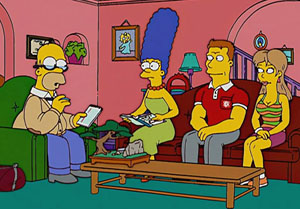 Another batting slump results, and it looks like the couple will split. Determined to right these wrongs, Homer hijacks the Duff blimp, to flash a fake “I love you – Tabitha” message to the player on the field. The player responds with a powerful clout of the ball, puncturing the blimp, and sending it crashing onto the field, revealing Homer inside but no Tabitha. Before the player (and the fans, armed with weapons from a mini-bat night promotion) can lay it into Homer, Marge, who has followed him to the stadium, appears on JumboVision with Tabitha, to shame everyone for picking on Homer for trying to save a marriage, and to let Tabiha send a screen love message to the player for real. The player remarks, at the close of the episode, that it looks like his marriage is going into extra innings, as Homer and Marge make a triumphant exit in style, in the baseball-shaped golf cart from the Isotopes’ bull pen.
Another batting slump results, and it looks like the couple will split. Determined to right these wrongs, Homer hijacks the Duff blimp, to flash a fake “I love you – Tabitha” message to the player on the field. The player responds with a powerful clout of the ball, puncturing the blimp, and sending it crashing onto the field, revealing Homer inside but no Tabitha. Before the player (and the fans, armed with weapons from a mini-bat night promotion) can lay it into Homer, Marge, who has followed him to the stadium, appears on JumboVision with Tabitha, to shame everyone for picking on Homer for trying to save a marriage, and to let Tabiha send a screen love message to the player for real. The player remarks, at the close of the episode, that it looks like his marriage is going into extra innings, as Homer and Marge make a triumphant exit in style, in the baseball-shaped golf cart from the Isotopes’ bull pen.
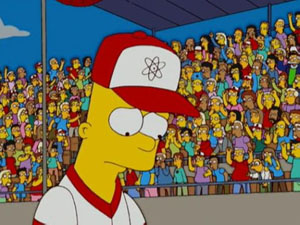 The Boys of Bummer (4/29/07) – The Springfield Isotots little league team is up for a championship game. Pitcher Nelson has a unique delivery, launching the ball to the plate with a sock from his bare fist. But the problem is Bart. While he got the team into the championship by hogging a catch away from Millhouse, stealing his thunder by catching a game-ending fly ball, he can’t repeat the feat under the pressure of the deciding crucial game. Bart commits the fielding error of fielding errors, letting the ball bounce out of his mitt, booting it into center field, tripping on it, falling all over himself, letting it roll to the fence – and never gets the ball tossed back to the infield, allowing the bases to clear for the winning runs. He becomes the town’s target of ridicule, and everyone starts throwing pop bottles at him. Bart escapes the stadium through a side exit, and is intercepted by Chief Wiggams, who offers him a lift in a squad car – only to drive the car back into the stadium, and roll down the convertible roof of the vehicle, subjecting Bart to further clobbering from the pop bottles. Bart can’t avoid blistering sport page reviews of his disastrous performance, and even morning radio show broadcasts where his schoolmates serenade with a song, “Bart Srinks”. Finally, Bart cracks under the pressure, and a mysterious run of graffiti messages appears on every building in town, reading “I hate Bart Simpson”. But who is the graffiti artist? Bart himself, trying to prove, as he is found marking up the Springfield water tower, that he hates himself more than anybody – so now can they all be friends? Relentless Chief Wiggams lets slip over a loudspeaker the word “Jump”, then denies having been the one who said it. Bart drops from the tower, luckily landing in some hedges, but knocked unconscious for a day.
The Boys of Bummer (4/29/07) – The Springfield Isotots little league team is up for a championship game. Pitcher Nelson has a unique delivery, launching the ball to the plate with a sock from his bare fist. But the problem is Bart. While he got the team into the championship by hogging a catch away from Millhouse, stealing his thunder by catching a game-ending fly ball, he can’t repeat the feat under the pressure of the deciding crucial game. Bart commits the fielding error of fielding errors, letting the ball bounce out of his mitt, booting it into center field, tripping on it, falling all over himself, letting it roll to the fence – and never gets the ball tossed back to the infield, allowing the bases to clear for the winning runs. He becomes the town’s target of ridicule, and everyone starts throwing pop bottles at him. Bart escapes the stadium through a side exit, and is intercepted by Chief Wiggams, who offers him a lift in a squad car – only to drive the car back into the stadium, and roll down the convertible roof of the vehicle, subjecting Bart to further clobbering from the pop bottles. Bart can’t avoid blistering sport page reviews of his disastrous performance, and even morning radio show broadcasts where his schoolmates serenade with a song, “Bart Srinks”. Finally, Bart cracks under the pressure, and a mysterious run of graffiti messages appears on every building in town, reading “I hate Bart Simpson”. But who is the graffiti artist? Bart himself, trying to prove, as he is found marking up the Springfield water tower, that he hates himself more than anybody – so now can they all be friends? Relentless Chief Wiggams lets slip over a loudspeaker the word “Jump”, then denies having been the one who said it. Bart drops from the tower, luckily landing in some hedges, but knocked unconscious for a day.
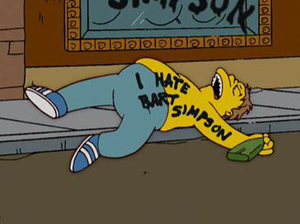 Marge confronts the townsfolk over what they have done to her little boy, and how it will mark his psyche forever. The townsfolk finally are shamed into admitting they’re sorry, but Moe remarks, “What can we do? It’s not like we could play the game over.” But Lisa proposes that that’s just what they need to do. On a contrived and fictitious technicality, word gets back to the revived Bart that the last inning wasn’t official, and has to be played over. Lisa uses her influence on the opposing team manager to cooperate, and even on the field announcer (a Vin Scully sound-alike, who is induced to re-call the game when Lisa tries to force-feed him one of his own pork sausages full of unspeakable byproducts), and soon the whole town is present for a re-do of the last of the ninth inning. The pitch, the pop fly, and the ball heads straight for Bart’s mitt. – and is dropped again! Quickly ad-libbing, Marge, Moe, and the umpire think of every excuse to call the play unofficial, and try it again. Bart takes the next one in the chest, losing the ball again. Another try. Bart’s clothes are blown off by the ball, in the manner of Charlie Brown. Again and again the at-bat is replayed, and by dawn’s early light and the 78th try, Bart finally makes the catch. The scene changes to the future, at an old folks’ home, where an elderly Bart and Milhouse sit, with Bart recounting his day of victory. Milhouse blurts out that the whole thing was a fake, and Bart nearly breaks down in tears again, until Milhouse again takes pity, and claims that his saying it was a fake was a fake. Bart yells “Woo-hoo” and makes remarks to the effect of “in your face”, while Milhouse just buries his own head in his hands, realizing that some people will never learn when they smell.
Marge confronts the townsfolk over what they have done to her little boy, and how it will mark his psyche forever. The townsfolk finally are shamed into admitting they’re sorry, but Moe remarks, “What can we do? It’s not like we could play the game over.” But Lisa proposes that that’s just what they need to do. On a contrived and fictitious technicality, word gets back to the revived Bart that the last inning wasn’t official, and has to be played over. Lisa uses her influence on the opposing team manager to cooperate, and even on the field announcer (a Vin Scully sound-alike, who is induced to re-call the game when Lisa tries to force-feed him one of his own pork sausages full of unspeakable byproducts), and soon the whole town is present for a re-do of the last of the ninth inning. The pitch, the pop fly, and the ball heads straight for Bart’s mitt. – and is dropped again! Quickly ad-libbing, Marge, Moe, and the umpire think of every excuse to call the play unofficial, and try it again. Bart takes the next one in the chest, losing the ball again. Another try. Bart’s clothes are blown off by the ball, in the manner of Charlie Brown. Again and again the at-bat is replayed, and by dawn’s early light and the 78th try, Bart finally makes the catch. The scene changes to the future, at an old folks’ home, where an elderly Bart and Milhouse sit, with Bart recounting his day of victory. Milhouse blurts out that the whole thing was a fake, and Bart nearly breaks down in tears again, until Milhouse again takes pity, and claims that his saying it was a fake was a fake. Bart yells “Woo-hoo” and makes remarks to the effect of “in your face”, while Milhouse just buries his own head in his hands, realizing that some people will never learn when they smell.
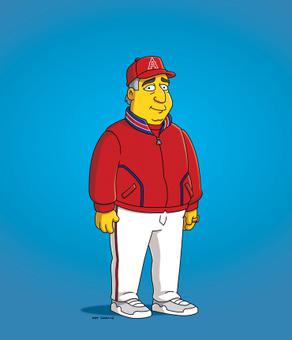
THE SIMPSONS: The L.A. Angels of Anaheim manager and former MLB catcher Mike Scioscia (guest-voicing as himself) gives Bart sound advice in the all-new "MoneyBart" episode of THE SIMPSONS.
Lisa begins managing by the book, benching players that don’t add up in her positive column of calculations, and keeping the others reined in from taking any uncalculated risks – and surprisingly, the system seems to work (as it did only in regular season play for the Dodgers). The Isotots climb in the standings, and are a win away from taking the division. But the team is restless, and feels like all the fun has gone out of their game – especially Bart, who swears that he will stand up for the game he loves. As Lisa observes that the pitcher has thrown two walks in a row, making the probability of another walk high, she instructs Bart not to swing at anything. Bart feigns a nod, with a facial expression denoting that it is entirely forced, then steps to the plate. Two balls pass him, according to Lisa’s plan. But Bart’s imagination sees Lisa’s face on the oncoming ball, shouting “I’ve ruined your game.” Bart can’t resist his own impulses, and belts the ball over the fence, scoring a home run, and winning the game his own way. Furious Lisa, despite the win, won’t put up with this kind of insubordination, and ejects Bart from the team, losing their best power-hitter.
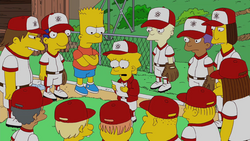 The championship game arrives. Marge takes Bart for a day at the amusement park to get his mind off of missing the event, while Lisa settles down to her books and business in the dugout. But Chief Wiggams’ son Ralph has incapacitated himself by guzzling up too many juice boxes before the game, leaving Lisa short a player. She places a panicked call to Mom, who passes the phone to Bart, to hear Lisa beg for him to come back to the team to play. Bart is about to turn her down, claiming he’s moved on, when Mike Scioscia (in his second cameo in the series), now a baseball manager with three World Series rings, pops up in the seat of a roller coaster behind Marge and Bart (losing one of his rings as the car performs a vertical loop). Scioscia advises Bart that you should always listen to your manager, prompting Bart to make a gracious return to the dugout as the crucial final inning commences. Bart is put in as pinch hitter, and Lisa and Bart engage in an extended conversation of “sign language” without words, as Lisa gives him signals on how to conduct the play. Bart gets a single, but takes a long lead off first. Lisa specifically signals him not to try to steal, as the odds are against him. Bart makes with his silent response, pretending that he’s got the message – but runs to second anyway, with time to spare and to the delight of the crowd. Lisa tries to tell herself she can live with that, then sees Bart taking a lead again. Her signals not to defy the laws of probability become more frantic, but Bart again takes a base with ease, standing at third. It’s the old Charlie Brown syndrome, with Bart wanting to be the hero by his own means, and Lisa going ballistic, as Bart defies all her signals and tries to steal home. As with Charlie Brown (though not by quite as many yards), Bart slides – and as the dust clears, is called out at the plate by about a foot. The Isotots lose the championship – but Lisa has learned something. Her racing heart has told her that that was the most exciting play she’s ever seen in baseball, and she tells her brother that she now realizes that baseball isn’t about number-crunching, but lives from unbridled emotions. She admits that Bart is an okay brother 51 percent of the time, and Bart, unwilling to put a statistical percentage on Lisa’s worth, merely hands her an oversized foam-rubber hand, on which is written, “Number 1″. Their teammates, though losers, pick both of them up upon their shoulders, and in unison repeat over and over “Conflict resolved!”:
The championship game arrives. Marge takes Bart for a day at the amusement park to get his mind off of missing the event, while Lisa settles down to her books and business in the dugout. But Chief Wiggams’ son Ralph has incapacitated himself by guzzling up too many juice boxes before the game, leaving Lisa short a player. She places a panicked call to Mom, who passes the phone to Bart, to hear Lisa beg for him to come back to the team to play. Bart is about to turn her down, claiming he’s moved on, when Mike Scioscia (in his second cameo in the series), now a baseball manager with three World Series rings, pops up in the seat of a roller coaster behind Marge and Bart (losing one of his rings as the car performs a vertical loop). Scioscia advises Bart that you should always listen to your manager, prompting Bart to make a gracious return to the dugout as the crucial final inning commences. Bart is put in as pinch hitter, and Lisa and Bart engage in an extended conversation of “sign language” without words, as Lisa gives him signals on how to conduct the play. Bart gets a single, but takes a long lead off first. Lisa specifically signals him not to try to steal, as the odds are against him. Bart makes with his silent response, pretending that he’s got the message – but runs to second anyway, with time to spare and to the delight of the crowd. Lisa tries to tell herself she can live with that, then sees Bart taking a lead again. Her signals not to defy the laws of probability become more frantic, but Bart again takes a base with ease, standing at third. It’s the old Charlie Brown syndrome, with Bart wanting to be the hero by his own means, and Lisa going ballistic, as Bart defies all her signals and tries to steal home. As with Charlie Brown (though not by quite as many yards), Bart slides – and as the dust clears, is called out at the plate by about a foot. The Isotots lose the championship – but Lisa has learned something. Her racing heart has told her that that was the most exciting play she’s ever seen in baseball, and she tells her brother that she now realizes that baseball isn’t about number-crunching, but lives from unbridled emotions. She admits that Bart is an okay brother 51 percent of the time, and Bart, unwilling to put a statistical percentage on Lisa’s worth, merely hands her an oversized foam-rubber hand, on which is written, “Number 1″. Their teammates, though losers, pick both of them up upon their shoulders, and in unison repeat over and over “Conflict resolved!”:
Abe League of Their Moe (4/27/25) – Quite a stretch for that poor title parody (the same idea was better done by a Futurama episode discussed below). Also a stretch in its opening flashback sequence, set in 1944, which directly conflicts with “Couple Play” discussed above, showing Abe Sompson at an age of about five or seven, attending an Isotopes game during the war with his unnamed grandpa. How can this be, as Abe was already supposed to be of draft age at the time and playing on a woman’s team? And who would have known the word “Isotopes” before the revealing of the atomic bomb? Someone should have thought this one through, but instead use this setup to allow Abe’s grandfather to carve “Grandpa and Abe” on a stadium railing, and say that someday, Abe will attend a game with his own grandson. Time flashes forward. The railing is still there, and Abe is still there. But he remarks to himself, “I’m still waitin’”, as Bart has never attended a game together with him. (Well, maybe not as a grandpa and grandson outing alone, but again, wasn’t the whole family together in “Couple Play”?)
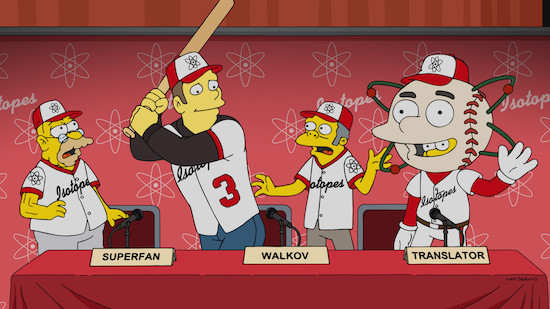
After Grampa and Moe recruit a Macedonian slugger to play in Springfield, it strains their friendship and the very integrity of baseball in the “Abe League Of Their Moe” episode of THE SIMPSONS.
Other than Abe, the stadium, and the railing, things have changed considerably over the years. The team is in another slump, and Abe seems to be the only one in regular attendance, the stadium entirely empty except for those on the field and the announcer. But Abe notices something different today – the frustrated gutteral moans of someone in the bleachers on the other side of the field. Company? It is Moe, who, other than moans, seems to have little to say, and sits grumpily by himself. “I’ll be right over”, shouts Abe, and switches seats to join him. Abe’s overtures of friendship finally get Moe speaking, and the two begin to hit it off from their common interest in the Isotopes, and wonder at how low the sport has fallen for their team. They find a common cause in “helping” the team, by jointly razzing a pitcher warming up in the bull pen, until he becomes angry enough to begin throwing the ball around with force and accuracy (enough so to bean Moe with a fast ball). They begin to pal around in their off hours at Moe’s tavern, shocking Homer (who sees them together as the man he’ll soon have to bury, and the man whose product will soon be burying him). But their mutual concern for the future of Springfield baseball remains the root of their friendship, until they see a news item on the TV news about a European superstar from Macedonia, Aeropos Walkov (who of course hits walk-off homers, plus is a pitching find with a unique two-handed windup), planning to leave his homeland to make a break into the majors here. It is of course anticipated that every major-league team will be vying to acquire him. But Abe and Moe get the notion that no team needs him more than the Isotopes. To lure him to Springfield, Moe, who has picked up the language from his grandmother as a child, produces with the help of Abe a VHS video on an ancient gasoline-powered video camera, welcoming and inviting Walkov to come and play for Springfield, in Walkov’s own native tongue. Some inadvertent shots of unsightly or devastated areas of the town remind Walkov of his own homeland. And so, the Isotopes acquire their first real superstar.
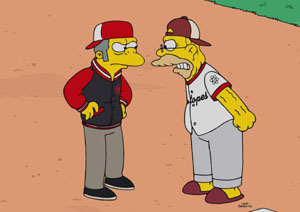 Walkov does not speak a word of English (though he tries to pick up the language from watching episodes of “Family Guy”, only seeming to learn Quagmire’s catch-phrase while woman-chasing of “giggity-giggity”). So Moe becomes his official translator. Abe tries to tag along on the coattails of Moe’s and Walkov’s success, but soon finds himself somewhat on the outside looking in, as massive changes take place at the stadium. Attendance swells until the stadium is packed – and expansions become necessary. While Abe is finally able to attend Walkov’s first game with Bart at his side, adding Bart’s name to the railing etching, the next game finds Abe’s traditional Section J transformed into exclusive luxury boxes for the filthy rich, and Section J moved to a new column of bleachers piled higher than the flight of the Duff blimp. The JumboVision screen gas grown to where it almost dwarfs the field itself, and now it seems that everything in the stadium is decked out with sponsorship advertisement – even the basepads. The broadcasts are as bad, with every play, and seemingly every movement of the players, sponsored by some company whose logo almost obliterates the telecast. The final straw is when hot dogs cease to be sold by the vendors, their foodstuffs replaced with middle-European specialties. Abe finally confronts Moe on the field, who seems to be basking in all of this, and accuses Moe of selling out instead of preserving the old game. In a heated argument, the two break off their friendship.
Walkov does not speak a word of English (though he tries to pick up the language from watching episodes of “Family Guy”, only seeming to learn Quagmire’s catch-phrase while woman-chasing of “giggity-giggity”). So Moe becomes his official translator. Abe tries to tag along on the coattails of Moe’s and Walkov’s success, but soon finds himself somewhat on the outside looking in, as massive changes take place at the stadium. Attendance swells until the stadium is packed – and expansions become necessary. While Abe is finally able to attend Walkov’s first game with Bart at his side, adding Bart’s name to the railing etching, the next game finds Abe’s traditional Section J transformed into exclusive luxury boxes for the filthy rich, and Section J moved to a new column of bleachers piled higher than the flight of the Duff blimp. The JumboVision screen gas grown to where it almost dwarfs the field itself, and now it seems that everything in the stadium is decked out with sponsorship advertisement – even the basepads. The broadcasts are as bad, with every play, and seemingly every movement of the players, sponsored by some company whose logo almost obliterates the telecast. The final straw is when hot dogs cease to be sold by the vendors, their foodstuffs replaced with middle-European specialties. Abe finally confronts Moe on the field, who seems to be basking in all of this, and accuses Moe of selling out instead of preserving the old game. In a heated argument, the two break off their friendship.
Things take a turn for the worse in Moe’s and Walkov’s fortunes, as Moe encounters Walkov engrossed in activity on his cell phone, of an unexpected kind. Walkov is engaging in on-line betting on baseball, and has become heavily indebted. Moe asks him where he picked up the idea for this habit – then looks around him at the neon advertising displays in the stadium, including prominent ads for sports betting, and gets the picture. Walkov, who had no idea what he was doing was wrong or prohibited, starts self-punishing himself with blows to the head with various items, breaks into crying jags, and announces to Moe his intention to call a press conference to make a clean breast of things. Moe can see this as a recipe for disaster, and tries to recruit Abe for any ideas to help. But Abe turns a cold shoulder to him after the way Moe treated him. Abe, however, finds a reason to attend the press conference, when he discovers that Bart has been influenced by the betting bug and advertisements too, and is gambling (taking a picture of Homer in the middle of a Duff-induced stupor for facial recognition to get online). Abe thus crashes the party at the conference, with Bart in tow.
Moe attempts to keep things under cover in spite of Walkov’s emotional public confession in his native language, with Moe deliberately mistranslating that Walkov loves the game of baseball, and everybody buckle up on their ride home. Abe steps forward to confront Moe instead of Walkov, displaying the nervously-gambling Bart trying to cover his losses with more bets. Moe realizes he’s ruining an innocent child, and Walkov, who is also almost like an innocent child. Moe comes clean as to what Walkov was trying to confess, but adds a note to the press, the management, and the game at large, of ruining the sport by allowing big money to come in, and being in bed with the bookies, destroying America’s pastime, then being hypocritical when someone like Walkov actually places a bet. Abe offers a consoling pat on the back, crediting Moe with really being concerned about saving the sport
The press announces the news that, after a thorough 45-minute investigation, the Commissioner has declared Walkov entirely innocent of all gambling charges, and pins all blame for the incident upon translator Moe, banning him from baseball. (The parallels of this plot twist are unmistakable, parodying the recent gambling scandals of Shohei Ohtani and his translator, and leaving open the speculation that Ohtani might himself have been somehow personally involved in it but absolved in a quick cover-up to save his celebrity status – you be the judge.) Moe returns to his tavern, with Abe still his friend at the bar, while Walkov moves on to a better offer in a bigger town. Abe declares that at least as a result of this, Bart isn’t gambling. Just then, Bart enters the tavern wearing a new spiffy business suit, and states, “The drinks are on me.” Abe changes his remark to, at least Bart isn’t losing.
 For a wrap-up this week, we’ll visit another Futurama episode spotlighting the future sport of Blernsball. A Leela of Her Own (4/7/02) isn’t nearly as imaginative as the innovations to the sport previously shown in “Fear of a Bot Planet”, and several of the game’s changes seem to disappear from view, making the game seem more akin to traditional baseball except for the bungee tether on the ball. A further notable change is that Fry now finally seems to understand the rules of the game, and becomes something of a tutor at it, when he and the Planet Express crew decide to help a family of immigrant aliens (from outer space, that is) assimilate to Earth culture. Fry, being a past expert on pizza, shows them how to cook the favorite in their newly-opened restaurant to the liking of humans, instead of their own family recipes with alien ingredients that taste like vomit and produce hallucinations. But Fry also proposes introducing them to the national pastime, via a sandlot game between the Planet Express crew and the extended alien family. Leela acts as pitcher, though she is quickly forced to admit (being a cyclops) that she has a problem with depth perception, as she beans the lead-off batter on the first pitch. The batter, cross-eyed from the blow, notes that he is now having trouble with depth perception too. Leela finds, to her dismay, that all she can throw is bean balls, conking four batters in a row, and thus walking over an opposing run. She is about to turn over the ball to someone else to pitch, but a crowd has gathered along the sidelines of the field, amused at the spectacle of Leela’s semi-lethal dead aim, and shouts for the team to leave her in. They begin chanting the word “Bean” over and over again, as Leela repeats her unbroken streak of direct cranium hits. Along comes the random Blernsball scout for the notoriously-losing team, the New New York Mets, who sees possibilities in Leela’s ability to draw crowds, and offers her a pitching position as Blernsball’s first female player.
For a wrap-up this week, we’ll visit another Futurama episode spotlighting the future sport of Blernsball. A Leela of Her Own (4/7/02) isn’t nearly as imaginative as the innovations to the sport previously shown in “Fear of a Bot Planet”, and several of the game’s changes seem to disappear from view, making the game seem more akin to traditional baseball except for the bungee tether on the ball. A further notable change is that Fry now finally seems to understand the rules of the game, and becomes something of a tutor at it, when he and the Planet Express crew decide to help a family of immigrant aliens (from outer space, that is) assimilate to Earth culture. Fry, being a past expert on pizza, shows them how to cook the favorite in their newly-opened restaurant to the liking of humans, instead of their own family recipes with alien ingredients that taste like vomit and produce hallucinations. But Fry also proposes introducing them to the national pastime, via a sandlot game between the Planet Express crew and the extended alien family. Leela acts as pitcher, though she is quickly forced to admit (being a cyclops) that she has a problem with depth perception, as she beans the lead-off batter on the first pitch. The batter, cross-eyed from the blow, notes that he is now having trouble with depth perception too. Leela finds, to her dismay, that all she can throw is bean balls, conking four batters in a row, and thus walking over an opposing run. She is about to turn over the ball to someone else to pitch, but a crowd has gathered along the sidelines of the field, amused at the spectacle of Leela’s semi-lethal dead aim, and shouts for the team to leave her in. They begin chanting the word “Bean” over and over again, as Leela repeats her unbroken streak of direct cranium hits. Along comes the random Blernsball scout for the notoriously-losing team, the New New York Mets, who sees possibilities in Leela’s ability to draw crowds, and offers her a pitching position as Blernsball’s first female player.
Leela suits up in attractive fashion, and, now being a pro player, actually invites Frt to smack her one on the rear (though Fry chickens out). She debuts as a novelty substitution when the night’s game looks absolutely lost, and the fans are heading for the exits. Announcer Bob Uecker (calling the game from a bottle as a preserved head, with the real Bob providing the voice-over) says he hasn’t seen such bad playing since when he played. But the announcement of “a one-eyed girl” in substitution draws the curious fans back to their seats. The novelty becomes even greater when Leela infallibly repeats her string of bean balls, and the chant of “Bean” goes up again. Leela becomes a fan favorite and a headliner attraction – even though the team is miserably losing.
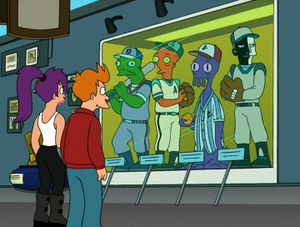 Bender acts as Leela’s agent, and soon has her (for hardly any pay) doing TV commercials to sell – what else – beans (or, for the Spanish audience, frijoles, with her pay in devalued pesos). She engages in autograph-signing sessions at the pizzeria for Bender’s profit at $5 a scribble, until a black girl in a baseball outfit confronts her. The girl is member of a college Blernsball team, and had hoped to be the first woman in the majors, until Leela destroyed the role image for the sport by making women appear as the laughing stock of the league. “I hope you’re satisfied”, says the girl, and walks out – leaving Leela in tears from her single eye.
Bender acts as Leela’s agent, and soon has her (for hardly any pay) doing TV commercials to sell – what else – beans (or, for the Spanish audience, frijoles, with her pay in devalued pesos). She engages in autograph-signing sessions at the pizzeria for Bender’s profit at $5 a scribble, until a black girl in a baseball outfit confronts her. The girl is member of a college Blernsball team, and had hoped to be the first woman in the majors, until Leela destroyed the role image for the sport by making women appear as the laughing stock of the league. “I hope you’re satisfied”, says the girl, and walks out – leaving Leela in tears from her single eye.
Leela vows to train to become the best Blernsball player ever, until Hermes tells her this is a statistical impossibility – so she changes her resolve to not being the worst Blernsball player ever. She visits a sports museum, where she finds a display dedicated to the current record-holder as the game’s worst – Hank Aaron the 24th, who, instead of being represented by a statue, is actually there as a live exhibit in the flesh, to the disgrace of the preserved talking head of Aaron the first across the hall (Hank Aaron himself providing the voice-over). Aaron the 24th doesn’t want to lose his cushy place in Blernsball history, so volunteers to provide Leela with training. Quickly identifying Leela’s problem from getting struck by another bean ball, the younger Aaron suggests that Leela try keeping her eye off the ball. Leela turns her head the other way from the plate as she hurls a fast ball – and accomplishes her first perfect strike. The trick is the secret to success.
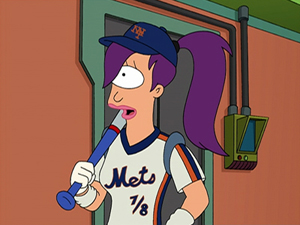 The last game of the season is scheduled that night, and though the Mets’ losing record makes the game meaningless, the team manager doesn’t want to let Leela play, as the Mets are finally winning a game for a change. The bases become loaded against them, and the manager shouts, “Isn’t there a man on this team who can get one more out?” “I can”, responds Leela. “I repeat, isn’t there a MAN on this team who can get one more out?”, says the manager sarcastically. Leela reveals her secret training under Hank Aaron. “You mean THE Hank Aaron?” asks the curious manager. “Well, A Hank Aaron”. Leela responds. She is put into the game, and to her surprise, encounters as her batting opponent the same black girl she had met at the autograph session, now signed up by the opposing team. Leela is happy to discover that her turning-away from the pitch trick still works, resulting in her not beaning the girl, but instead, to the surprise and somewhat disappointment of the crowd, delivering a perfect strike. Another strike follows, and Leela determinedly casts the third and possibly deciding pitch. To everyone’s amazement, including Leela, the girl connects, whacking the Blernsball so hard, it snaps off its bungee cord, and heads for a bulls-eye target posted on a giant billboard, reading “Hit it here and win the game.” Leela walks a lonely walk into the dugout, as Uecker announces yet another loss for the Mets, and further proclaims that Leela will go down in history as the single worst player in the history of the game. But the black girl calls to Leela before she can disappear into obscurity. The girl tells Leela that she wasn’t such an awful role model after all. Instead, Leela was so bad that other women aspired to prove that they didn’t stink as bad as she did. But she asks that Leela give up the sport, so that the other women now have a chance for legitimate recognition. In parody of a well-remembered commercial where a sports figure tosses one of his articles to a little boy as an item of memorabilia, Leela tosses her towel to the girl – and once again, beans her in the face. The film’s final scenes show the sports museum, with Aaron the 24th’s berth replaced by a life-size stand-up cardboard cutout of Leela, and Aaron the 24th sadly taking his last look around, as he shuts out the lights and exits the museum.
The last game of the season is scheduled that night, and though the Mets’ losing record makes the game meaningless, the team manager doesn’t want to let Leela play, as the Mets are finally winning a game for a change. The bases become loaded against them, and the manager shouts, “Isn’t there a man on this team who can get one more out?” “I can”, responds Leela. “I repeat, isn’t there a MAN on this team who can get one more out?”, says the manager sarcastically. Leela reveals her secret training under Hank Aaron. “You mean THE Hank Aaron?” asks the curious manager. “Well, A Hank Aaron”. Leela responds. She is put into the game, and to her surprise, encounters as her batting opponent the same black girl she had met at the autograph session, now signed up by the opposing team. Leela is happy to discover that her turning-away from the pitch trick still works, resulting in her not beaning the girl, but instead, to the surprise and somewhat disappointment of the crowd, delivering a perfect strike. Another strike follows, and Leela determinedly casts the third and possibly deciding pitch. To everyone’s amazement, including Leela, the girl connects, whacking the Blernsball so hard, it snaps off its bungee cord, and heads for a bulls-eye target posted on a giant billboard, reading “Hit it here and win the game.” Leela walks a lonely walk into the dugout, as Uecker announces yet another loss for the Mets, and further proclaims that Leela will go down in history as the single worst player in the history of the game. But the black girl calls to Leela before she can disappear into obscurity. The girl tells Leela that she wasn’t such an awful role model after all. Instead, Leela was so bad that other women aspired to prove that they didn’t stink as bad as she did. But she asks that Leela give up the sport, so that the other women now have a chance for legitimate recognition. In parody of a well-remembered commercial where a sports figure tosses one of his articles to a little boy as an item of memorabilia, Leela tosses her towel to the girl – and once again, beans her in the face. The film’s final scenes show the sports museum, with Aaron the 24th’s berth replaced by a life-size stand-up cardboard cutout of Leela, and Aaron the 24th sadly taking his last look around, as he shuts out the lights and exits the museum.
NEXT TIME: A potpourri of more Fox network items from other studios, and other miscellany.